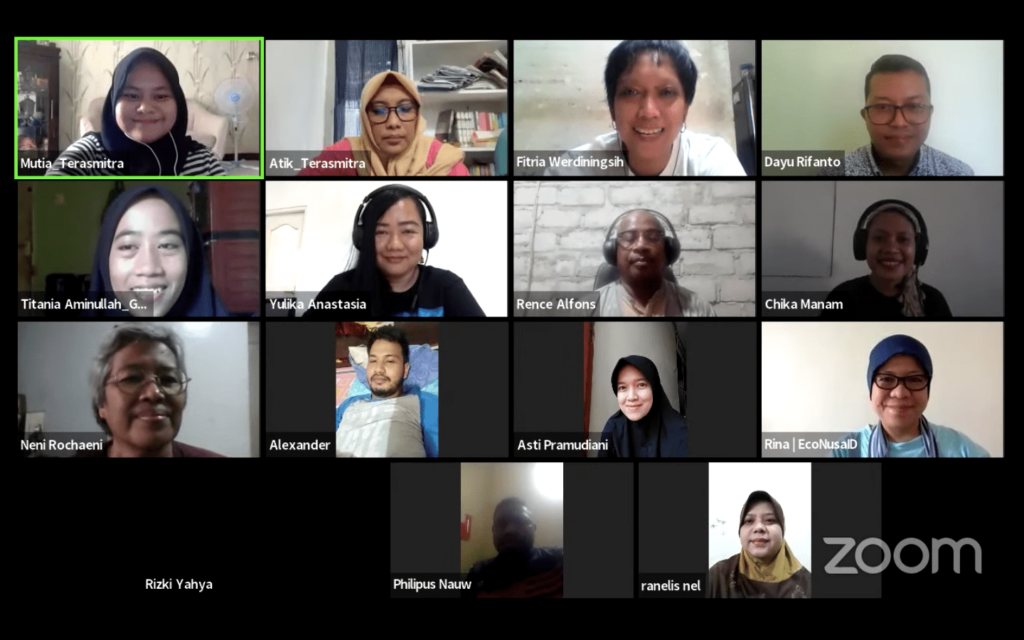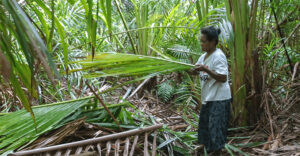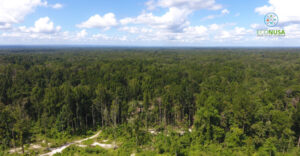
Eastern Indonesia is not merely natural resource rich regions. Their culture is diverse. There are many stories from Tanah Papua, Maluku Island, and Sulawesi we could share to public. There are many ways to disseminate the fascination of eastern Indonesia.
“From Imaji Papua, we use documentary film, because it could serve as an effective medium in such a way that viewers could observe the Papuan peoples’ daily lives from film,” said Yulika Anastasia, the founder of Imaji Papua, on the webinar entitled “Beauty of Taste for Indonesia” collaboratively organized by Terast Mitra and EcoNusa on Saturday 16 april 2022.
Imaji Papua is a creator and independent film maker community based in Jayapura City, Papua. The community actually does not only produce documentary film, but also advertising film, animation film, and other creative contents. However, their names gained reputation when Yulika-produced film, “Tonotwiyat (Women Forest)”, was nominated on the 2019 Citra Award for the best and longest documentary film. The next documentary production was “Noken Rahim Kedua (Noken, Second Womb)” was also nominated for the 2021 Citra Award.
Read also: EcoNusa and Pramuka Collaborating for Sustainable Environment
“Imaji Papua members happen to have journalism background. So far, there are too many negative political news as if Papua is overwhelmed with conflict. It motivates us to introduce Papua from different dimension,” said Yulika elaborating the origin establishment of Imaji Papua in 2017.
In “Noken Rahim Kedua”, Imaji Papua captured the native life of women dwelling in mountainous areas like Wamena, Jayawijaya, with poor facilities. To get there, Imaji Papua team should get a ride by truck due to the absence of public transportation. The trip should be continued by walking along the mountainous paths.
On the film, Imaji tells a story of women in Wamena mountains who use nokens to carry various stuffs such as wood, vegetables from the local market, and even to cradle their babies. Thus, noken is depicted as the second womb. “In a noken, there are sources of daily life in which the life starts,” said Yulika.
Read also: The Fate of Democracy and Environment are at Youngsters’ Hands
Dayu Rifanto has different style to tell about Papua. The lecturer of Pelita Bangsa University, West Java, initially assisted an establishment of reading club in Nabire upon his colleague’s request. Dayu who was grown up in Papua has initiated a movement by collecting donated books to deliver to reading clubs in Papua and West Papua since 2012.
However, as from the large number of books, only few children story book tells about Papua. He could only collect some books that are not on a bookshop such as those entitled “Yanes, Penakut yang Menjadi Pemberani (Yanes, the Coward Turning to Be Bolder)” and “Dilawan Naga (Struck by Dragon)” written by Celcius Akwan. His colleague asked him to write a book on Papuan children. “Then, I study and learn to write and edit. Later I founded an independent publishing house,” he said.
From the publishing, Dayu published some books such as poem anthology entitled “Mama Menganyam Noken (Mother Knitting Noken)” by Godi Usnaat which was listed on the top five of Kusala Sastra Khatulistiwa 2020. The anthology was then published by Kompas Gramedia. He also published a book “A Story of Tosini, Asmat Kid” written by educators in the remote Papua, Rosa Dahlia and Roy Des. In January 2021, Dayu founded Pinjam Pustaka reading club in Sorong. “In fact, children are very enthusiastic in reading,” he added.
Read also: Papua, Maluku, We Can, Anything Possible
Similarly, Titiana Aminullah and her friends from Generasi Lestari community in Gorontalo, North Sulawesi, also published a book. But, her book “Anak Muda dan Makanan Lokal Gorontalo (Youth and Local Culinary of Gorontalo)” talks about local food due to Titania and her friends’ worry about young people that might no longer love local food. “Initially, we exchanged ideas wondering that we are quite reluctant to consume local food. In fact, based on several discussions, the information on local food has been cut off,” she said.
Titania and her friends wrote a book to connect the disrupted information on local food so that there will be more youngsters have broader knowledge on their traditional food. For instance, ilabulo made of sago mixed with chicken and fish inside organs, and sada porridge made of corn leftover.
In addition to tradition conservation, as to Titania, the preservation of local food is important as it has direct impact to environment and the surrounding community welfare. “When we consume a lot of local food, we indirectly support the local farmers, local culinary business, and will ensure hygienic condition from the food supply,” she said.
Read also: The Rainforest and Birds-of-Paradise’s Preservation in Papuan Culture
Meanwhile, according to R.N. Alfons, a composer and choreographer, prefers music to introduce Ambon as the city of music. In September 2005, he founded a bamboo-made flute orchestra so-called Moluccan Bamboowind Orchestra. “Bamboo-made flute is the Ambonese’s traditional music. It has humanity, religious, education, economic, aesthetical values and one of the community’s identities,” said Alfons.
The orchestra consist of members with different levels which ranges from the sixth grader of elementary school, junior and senior high schools students, university students, retired civil servants and police officers, teacher, to ojek (motor taxi) driver and palm juicer. The Moluccan Bamboowind Orchestra has often collaborated with reputable musicians such as the late Glenn Fredly, composer I Made Subandi, jazz musician Neil Brouwer, singer Monica Akhary, and Italian opera singer Fabio Andreotti.
Ambon Mayor was once called Alfons to write a local syllabus for local music which is obligatory to elementary and junior high schools. “We utilize traditional music because we should introduce local culture to the young generation. Traditional music is our own personality,” said Alfons.
Editor: Leo Wahyudi




